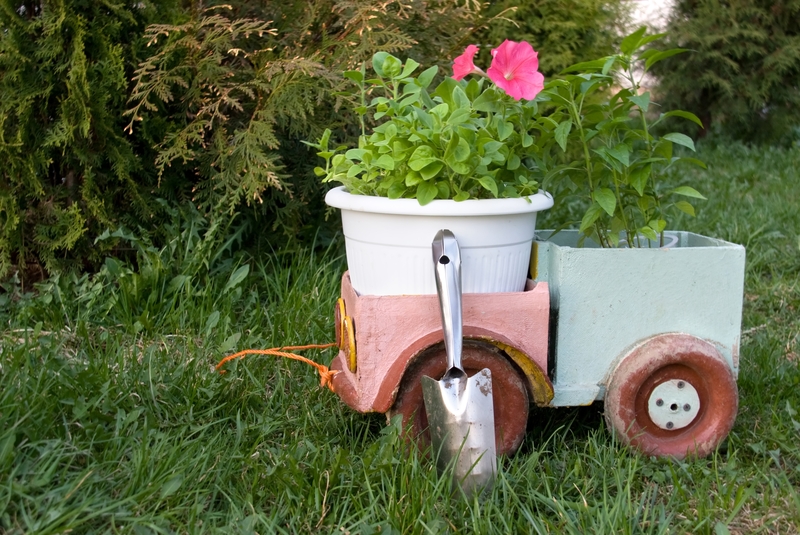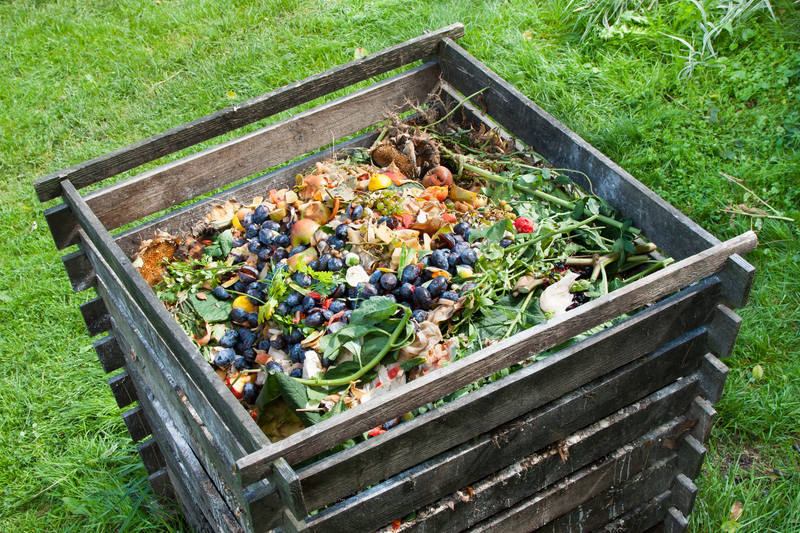Smart Living: Cutting Down Waste in Your Residence
Smart living is more than a trend--it's a lifestyle choice that empowers you to foster sustainability and efficiency in your everyday life. In our fast-paced, consumer-driven society, residential waste continues to increase, affecting both the environment and our well-being. Fortunately, adopting smart strategies for cutting down waste in your residence is entirely achievable. In this comprehensive guide, you'll discover actionable tips, groundbreaking technologies, and mindset shifts that enable your home to become an eco-friendly haven.
Why Reducing Household Waste Matters
Every year, households generate millions of tons of waste. This includes food scraps, packaging, electronics, plastics, and more. Not only does this overload landfills, but it also exacerbates pollution, depletes resources, and contributes to climate change. Cutting down waste at home is a powerful step towards smart living--helping you save money, conserve resources, and protect the planet for future generations.
- Environmental Protection: Less waste means less pollution and reduced greenhouse gas emissions.
- Health and Well-being: Cleaner homes and less exposure to harmful chemicals or unsanitary conditions.
- Financial Savings: Reduced consumption leads to lower utility bills and fewer purchases.
- Resource Conservation: Less demand for new products conserves raw materials and energy.

Understanding the Smart Living Mindset
Smart living involves making intentional lifestyle choices that minimize waste, promote energy efficiency, and maximize convenience--without sacrificing comfort. It's about leveraging technology, embracing new habits, and cultivating an eco-conscious mindset. When you prioritize waste reduction in your residence, you become part of a global movement driving positive change.
The 5 R's of Waste Management
- Refuse: Decline unnecessary items, such as single-use plastics.
- Reduce: Buy and use less, avoiding overconsumption.
- Reuse: Opt for reusable products and give items a second life.
- Recycle: Sort and manage recyclables according to local guidelines.
- Rot: Compost organic waste to enrich soil and reduce landfill dependency.
Practical Steps to Cut Down Waste in Your Residence
1. Start with a Waste Audit
A waste audit is the foundation of smart living and waste reduction. Spend a week monitoring everything you throw away--food scraps, plastics, packaging, electronic waste, etc. This process will help you understand your unique waste habits and identify where adjustments are most needed.
2. Adopt Smarter Shopping Practices
Making informed purchases is a cornerstone of cutting down waste at home. Here's how to shop smart:
- Choose Bulk: Buy in bulk to reduce packaging waste and save money.
- Avoid Single-Use Items: Opt for products that last, such as reusable bags, water bottles, and coffee cups.
- Prioritize Minimal Packaging: Select products with little or recyclable packaging.
- Plan Your Shopping: Create lists to prevent impulse buying and food waste.
- Support Local and Sustainable Brands: Local goods typically have lower transportation emissions and more transparent supply chains.
3. Embrace Reusable Products
Cutting down residential waste is easier when you shift from disposable to reusable alternatives. Consider incorporating these items into your daily life:
- Cloth towels and napkins over paper products
- Stainless steel or glass containers instead of single-use plastic bags
- Rechargeable batteries over disposables
- Fabric grocery bags and produce sacks for shopping
- Beeswax wraps as a substitute for plastic wrap
4. Optimize Food Management
Food waste is a significant contributor to household landfill. The good news is that smart living solutions can drastically cut down food waste:
- Meal Prep: Plan meals in advance and buy only what you'll use.
- Proper Storage: Store produce correctly to extend shelf life (e.g., use crisper drawers, airtight containers).
- First In, First Out (FIFO): Arrange food so older items are used before new purchases.
- Creative Leftovers: Repurpose leftovers and scraps into new meals, broths, or compost.
- Compost: Start a home compost bin or use municipal services to turn organic waste into nutrient-rich soil.
Did you know?: The average household throws out nearly one-third of all food purchased--smart management can turn that waste into savings.
5. Sort and Recycle Properly
Effective recycling starts with knowing what goes where. Educate your household on local recycling rules, label bins clearly, and rinse containers before recycling to prevent contamination. For items not accepted curbside:
- Take e-waste (electronics, batteries, light bulbs) to designated drop-off points.
- Look for community bins for textiles or hazardous materials (paints, chemicals).
- Explore mail-in programs for difficult-to-recycle materials (e.g., TerraCycle programs).
Integrating Technology for Smart Waste Reduction
The rise of smart home technology offers innovative ways to monitor and reduce waste in your residence. Consider these high-tech solutions:
Smart Kitchen Gadgets
- Smart fridges: Track expiration dates, suggest recipes with on-hand ingredients, and minimize food spoilage.
- Portion control scales: Help you cook only what you need, preventing food waste.
- Composters: Indoor electric composters efficiently break down food scraps for quick and easy soil enrichers.
Home Automation & Waste Monitoring
- Smart bins: Use sensors to analyze waste output and provide suggestions for cutting down waste.
- Energy-saving smart plugs and thermostats: Reduce resource consumption and lower utility bills.
Apps & Digital Tools
- Apps like Too Good To Go or Olio connect neighbors for sharing surplus food and supplies.
- Waste sorting apps offer instant tips for disposing of household items correctly.
- Shopping lists and meal planners to prevent overbuying and reduce food spoilage.
Room-by-Room Guide to Waste Reduction
Kitchen
- Streamline Pantries: Keep a detailed inventory of staples to avoid duplicate purchases.
- Glass Jars: Store bulk items in glass for better longevity and zero plastic waste.
- Swap Paper Towels: Use washable cloths for cleaning.
Bathroom
- Eco-Friendly Products: Choose bar soaps, refillable shampoo, and bamboo toothbrushes.
- Reusable Razors: Ditch disposables for stainless steel alternatives.
- Unbleached Toilet Paper: Look for TP made of recycled materials and sustainable packaging.
Living Room & Home Office
- Go Paperless: Request digital bills and apps instead of paper statements.
- Limit Electronics--donate, recycle, or repurpose outdated gadgets.
- Second-hand Furniture: Buy or repurpose used items rather than new purchases.
Laundry Room
- Cold Water Washing: Wash clothes in cold for energy savings.
- Full Loads Only: Maximize efficiency and reduce water usage.
- Drying Racks: Air-dry clothing to extend garment life and save energy.
Outdoors & Garden
- Compost Bin: Collect food and yard waste for DIY fertilizer.
- Rainwater Collection: Use rain barrels to irrigate plants and reduce water waste.
- Native Landscaping: Choose local plants that require less maintenance and fewer resources.
Engage the Household--Make Waste Reduction a Team Effort
Achieving a zero-waste residence is a group project. Involve all household members by:
- Setting shared goals (like reducing landfill contributions by 50%).
- Assigning waste-reduction tasks to each person.
- Scheduling periodic waste audits and reward milestones.
- Educating children about environmental stewardship through games and activities.
When sustainability becomes part of your household culture, everyone benefits--and the planet does too.
Creative Upcycling & DIY for a Smart-Focused Home
Smart living means reimagining waste as a resource:
- Upcycle Glass Jars: Repurpose as vases, pen holders, or for homemade preserves.
- Pallet Furniture: Build coffee tables or shelves with reclaimed wood.
- Fabric Scraps: Sew them into quilts or cleaning rags rather than discarding.
- Old Towels: Cut into washcloths or pet bedding.
- Wine Corks: Turn into trivets or unique crafts.
Overcoming Challenges in Cutting Down Residential Waste
Adopting waste-reducing habits isn't always easy. Common obstacles include:
- Convenience Culture: Single-use products are often marketed as timesavers, but usually at an environmental cost.
- Initial Investment: Sustainable alternatives sometimes have higher upfront costs, though they pay off long-term.
- Lack of Access: Not all communities offer convenient recycling, composting, or bulk options.
- Resistance to Change: Building new habits takes time and patience.
Tips for Success: Start small, set realistic goals, and celebrate progress. Every positive change counts--perfection isn't required for meaningful impact.

The Future of Smart Living: Trends in Waste Reduction
As more homeowners embrace smart living for waste reduction, cutting-edge innovations will make sustainable choices easier:
- Zero-Waste Stores: More shops focus on package-free, local, and eco-conscious goods.
- Advanced Recycling: AI-powered sorting and new materials (like compostable plastics)
- Smart Appliances: AI-enabled devices that automate and optimize waste management.
- Community Sharing Platforms: Apps connecting neighbors for lending, borrowing, and sharing surplus items.
Conclusion: Smart Living Starts at Home
Transitioning to a smart residence that cuts down waste isn't just good for the environment--it's a pathway to a more efficient, cost-effective, and mindful lifestyle. By understanding your household's unique waste patterns, adopting reusable habits, leveraging technology, and involving your household, you'll not only slash your home's waste output but also inspire your neighbors and community to do the same.
Every small choice matters. The journey to smart, waste-free living begins one decision at a time.
Further Resources
- EPA: How Do I Recycle?
- Zero Waste Home
- Plastic Free July
- TerraCycle: Specialized Recycling Solutions
Start your journey toward smart, waste-conscious living today--and see firsthand how cutting down waste in your residence can transform your home, your wallet, and the world.